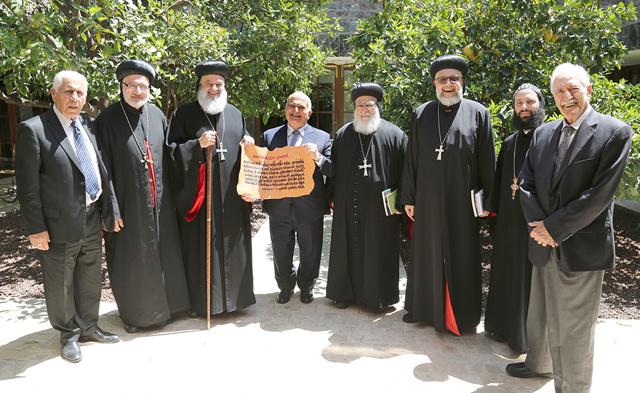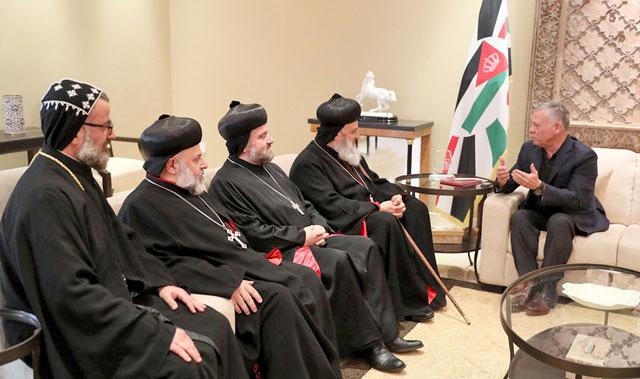You are here
Prince Hassan, patriarch of Antioch discuss interfaith harmony, pluralism
By JT - Apr 11,2019 - Last updated at Apr 11,2019

HRH Prince Hassan meets with the with Patriarch Mor Ignatius Aphrem II, Patriarch of Antioch and All the East and Supreme Head of the Universal Syriac Orthodox Church (third from left) and his accompanying delegation, on Wednesday (Petra photo)
AMMAN — HRH Prince Hassan, chairperson of the Royal Institute for Inter-Faith Studies’ board of trustees, on Wednesday said that respecting pluralism and diversity in the “Mashreq” (eastern Arab world), would lay the groundwork for civilised coexistence based on understanding, dialogue and maintaining human dignity.
Prince Hassan’s remarks came during a meeting with Patriarch Mor Ignatius Aphrem II, Patriarch of Antioch and All the East and Supreme Head of the Universal Syriac Orthodox Church, and his accompanying delegation, according to a statement issued by Prince Hassan’s office.
Prince Hassan said that continuous Muslim-Christian dialogue emphasises the two group’s shared destiny and invites people to develop a social dialogue that bolsters tolerance and mutual respect and deepens the unity of society.
During the meeting, Prince Hassan attached importance to discussing democratic security for all nations, noting that when tackling international laws, especially the right of protection, the right of respect must play a role as man and integrity are integral parts.
The delegation commended the Kingdom’s role in defending Jerusalem’s holy sites, as well as the Hashemite family’s efforts to safeguard Christians in the Mashreq, highlighting sharif Hussein Bin Ali’s role in this regard.
Talks also covered Prince Hassan’s efforts to shed light on the kidnappings of bishops, as the guest delegation praised the prince’s efforts on the international stage.
Condemning the kidnappings, Prince Hassan had issued a statement calling on all stakeholders to pay attention to the issue and work to resolve it, saying that the bishops worked to serve members of the Church during times when violence in the name of religion had been escalating.
Related Articles
AMMAN — HRH Prince Hassan, president of the Arab Thought Forum (ATF), on Monday called for the revival of Arab renaissance towards achieving
AMMAN — His Majesty King Abdullah on Tuesday received Patriarch Mor Ignatius Aphrem II, Patriarch of Antioch and All the East and Supreme He
HRH Prince Hassan, chairman of the Royal Institute for the Inter-Faith Studies’ board of trustees, on Sunday met Bishop Jean Kockerlos, auxiliary bishop of Mechelen-Brussel and an accompanying delegation.

















